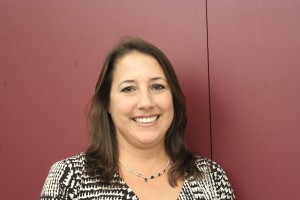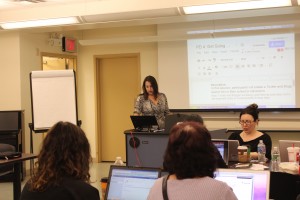
On a recent dreary Thursday morning, around 30 technology instructors and school librarians from all over the city assembled on the fourth-floor conference of District 20’s office building in Bay Ridge, Brooklyn. They sat with their laptops and iPads at about two dozen tables with the gray and black wires of various chargers scattered around them. They would need their devices at full power today for the five-hour professional development session. Running out of juice was not an option.
Lisa Nielsen stood at the front of the room next to a projector screen showing a Google document with the day’s agenda, which was very different from conventional professional developments sessions on such relatively dry topics as classroom management or new ways to teach reading. Nielsen, the Department of Education’s first director of digital literacy and citizenship, was the star attraction at this gathering.
“When you tweet and Facebook, you have to know it could be on the front page of the paper tomorrow,” the 44-year-old Nielsen told the educators, whose eyes were glued to their computer screens. “But you want to teach kids and yourself to tweet in ways that you want to be on the front page.”
It was the second session of Nielsen’s course on using social media for teaching purposes and managing “digital footprints.” The latter term in how Nielsen described information found online that can help or hurt one’s chances of being accepted to college or getting a job.
Starting off, Nielsen gave the educators tips on how to control their online image. She told them they could delete information they didn’t want public or change their privacy settings to share only certain things. They could flood the web with good pictures of themselves by uploading more flattering pictures to push the embarrassing ones to the end of search result pages. If they were really squeamish about being searchable online, they could even create numerous profiles on different websites but keep them free of information just to have them fill the first couple of result pages. That would push information they do not want people to know further down.
“If you don’t control your message someone else will,” she warned, adding that their students were definitely Googling them to uncover any secrets.
Nielsen has been a tech evangelist and an educator for two decades. She is the author of Teaching Generation Text, a book on how to use cell phones to enhance learning, and also manages a blog called The Innovative Educator. She grew up in Los Angeles and Las Vegas and received her bachelor’s degree from the University of Las Vegas. She moved to New York at age 21, getting her master’s in elementary teaching from Adelphi University. She completed a school district administrator certification in 2006. Though she is a certified teacher, Nielsen has spent much of her career helping educators update their practices to incorporate technology. That expertise led the Department of Education to take her on as an instructional technology administrator in 2009 though she had been working for the department since 1997 when she was hired as a librarian.
Her new role – which she started in September – grew out of the release last April of the Department of Education’s new social media guidelines. At the time, Nielsen held the title of director of technology innovation and she wondered if teachers, many of whom have no or limited experience with social media, would know how to apply the new guidelines.
So Nielsen, who has been an advocate of social media and the use of technology in the classroom for years, asked department officials how they planned to implement these new rules. When no one could answer her, she proposed creating a new position to solve the problem.
The department put out an ad for the position and a few months later, Nielsen found herself with a new job, which she said might be the only position of its kind in the country.
Nielsen said she doesn’t know how many other people applied for the same position, but was chosen because of her expertise. The New York Post alleged her new job came with a salary as high as $170,000, which Nielsen called an “exaggeration.” She made $114,395 in 2011 at her previous position. Since she just started her new job in the fall, her salary for the current year is not yet available online. The Department od Education did not respond to requests for more information on the job application process.
Steven W. Anderson, the director of instructional technology of the Winston-Salem/Forsyth County schools in North Carolina and an influential social media advocate himself, said that he thought Nielsen, whom he knows, is perfect for the job. He added that while he understood why New York might need her expertise, it’s unnecessary for his own state.
“Speaking for me and my district and most in North Carolina and in other parts of the country, the position wouldn’t be necessary and many, including myself, would argue we hold that title, although unofficially,” he said. He added that his staff of seven technology instructors are already engaged in the same kind of work.
Though her job is to train teachers and students on how to properly make use of the internet as a whole, Nielsen emphasizes training in social media skills. Nielsen said these skills have become crucial for 21st century success and finds many teachers agree by the end of her lesson. Still, others wonder if this new position is really necessary.
David Liotta, a history teacher at Intermediate School 62 in Brooklyn, is skeptical. He said Nielsen’s job would only be necessary if social media usage was made mandatory in schools, which it is currently not.
“If the purpose of education is to learn, then it should be at the students’ benefit, not the benefit of creating another job, in which there has to be problems in order to exist,” he said.
Nielsen argued that for educators, teaching use of social media was a “moral, ethical, and professional responsibility” in order to ensure that students are college and career ready.
“This job was created out of a desire by educators [who said] ‘We want to do this, we’re not sure how, what best practices are – we need help,’ ” she said. “A job was created for a need from the field, not because anyone wanted to create a job for anyone.”

Citing recent surveys, Nielsen said 66 percent of employers and 24 percent of college admissions officers look up their applicants online. She gave the example of Armond McFadden, a college student she mentors who went to vocational school. He has been interested in buses since childhood, has created a blog solely about buses and has used other social media applications to express his interest in them through which he was able to land internships with the Metropolitan Transit Authority. No one at his school ever taught him how to fill out applications for jobs or write resumes to apply for the jobs he wants, she said. However, through a social media tool like Kred, employers like the MTA can check McFadden’s digital footprint to discover that most of his online activity has been centered around public transportation. She added that a few schools have now hold classes on how to prepare for college and job hunting, but more are needed and social media skills would help.
“If we really want to prepare our kids for college and career, this is real world writing and preparation,” Nielsen said mentioning that learning these new skill fit in well with the goals of the Common Core.
At the recent training session, Nielsen had the educators go through several websites to set up accounts and asked to think about how they might use these sites in their own classrooms.
Renny Fong, a technology specialist at Public School 130 in Little Italy, took four of Nielsen’s classes on acceptable internet use and social media. He said he found her lessons very useful in helping teachers stop fearing technology and use it to enhance learning and give their students a voice.
“Right now, most see teacher use of social media as a ‘gotcha’ type of mentality,” he said. “It’s more about teachers and students getting into trouble in the media that scares many away from considering its potential to be a powerful learning tool for students. Without the support of someone in the DOE to help develop the social media skills and the know-how, most will not consider taking this risk.”
Fong said that one of Nielsen’s ideas that has been most beneficial to him is having an online personal learning community made up of teachers that he consults with on how to better integrate technology in his classroom. He has also shared his skills with other teachers at his school, some of whom have created lesson plans and class activities on Edmodo and use Weebly to share student work and have students engage in discussions about their lessons.
John Sorocco, a technology teacher at Intermediate School 223 in Borough Park, Brooklyn, has not taken any of Nielsen’s new classes but has worked with her on projects in the past. He believes her new position is a step in the right direction. He said a high percentage of bullying occurs on social media sites like Facebook and that the City Council has appropriated money to provide bullying education. Sorocco believes Nielsen’s job is necessary even when schools are facing budget cuts.
“I believe that it is a good use of money,” the 59-year-old said. “Let’s take the time to educate students on the positive uses of social media. The school system is indirectly spending time and effort on discipline problems caused by social media.”
So far, Nielsen has only been holding professional development sessions for librarians, technology teachers, and parent coordinators throughout the city on how to use the most common social media applications like Facebook, Edmodo, Twitter, and blogs. She is the only member of her department and has trained more than 87 teachers who have a reach of 388 schools throughout the city. Next year she will be working with general education teachers to develop the same set of skills.
Deven Black, a librarian at Castle Hill Middle School in Manhattan, is one of four members of a review committee that oversees Nielsen’s work as part of her directorship of digital literacy and citizenship. He said it was essential for teachers to be social media savvy because sites like Twitter are increasingly being used by teachers to share ideas and resources, which means that less savvy colleagues will miss out on these beneficial exchanges.
Though he was unaware that Nielsen had already begun training teachers under her new job, he predicted teachers would learn a lot from her. Because of advances in this field, more professional development has been conducted through these channels and for this reason, teachers need to be proficient in how to use them, he said.
At the end of the session as teachers made their way out of the conference room, some stopped by Nielsen with big smiles to thank her. But at least one teacher found the day’s lesson too difficult to digest.
“You’re underestimating how hard it is for the less intellectually-oriented parents,” said a technology instructor who had a hard time setting up a Twitter account. The woman, who refused to give her name, explained that she had to teach these skills to parent coordinators at her school who were not so familiar with new technology. “If it’s throwing me off, it’s going to throw them off.”
“Maybe it’s so simple, it’s sounding confusing,” Nielsen responded. The teacher gave a skeptical look but the social media expert said if she emailed her with any questions and concerns Nielsen would help her as best she could.
Tweets from Nielsen
http://storify.com/aasif89/tweets-from-nielsen



